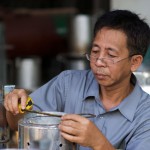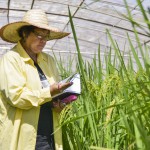The agriculture sector is faced with challenges this year: rice-security and farmers competing with the international rice market. Amidst these, the Institute recruits new staff and employs research fellows, not only for science, but to ensure that its discoveries and technologies are used for development in the rice sector.
Excelling in their fields of expertise, Dr. Emmanuel R. Tiongco, Dr. Truong Hoai Xuan, Dr. Alexis T. Belonio, Thelma F. Padolina, and Zenaida M. Flores are continuing their dynamic and quality projects as fellows of the Institute under the Research Fellowship Program.
Tiongco, an expert in plant pathology pursues his research on rice tungro disease, one of the major threats in rice agriculture. He will be leading this study under the Pest Risk Identification and Management (PRIME) Project, a collaborative effort between PhilRice, DA-Bureau of Plant Industry, International Rice Research Institute, and the DA Regional Field Offices. He will also be providing technical support in the production of antisera (serum) to detect rice tungro bacilliform virus (RTBV) and rice tungro spherical virus (RTSV). He will serve as a member of the editorial board of the Rice-Based Biosystem Journal, a peer-reviewed scientific journal managed by PhilRice, and a research adviser at the Institute’s Crop Protection Division. Previously, Tiongco and his team applied the loop-mediated isothermal amplification (LAMP) assay, a technique to detect RTBV in plants even before the common symptoms of infection become noticeable.
Truong, from Vihn Long Province, Vietnam, is also advancing his work on rice insect and disease management as a senior research fellow. Presently, he leads the implementation of the Philippine Council for Agriculture, Aquatic and Natural Resources Research and Development (PCARRD) funded-project to develop a biofertilizer containing multiple strains of Rhizobacteria, a soil bacteria found around the root surface that promotes plant growth. The project will come up with a recommendation on the use of the said fertilizer for promotion and adoption.
 Belonio leads the development and design of a system where rice husks will be used as producer gas to fuel single- and multiple-cylinder diesel engines. When completed, this can help farmers and farmers’ using diesel engines to reduce their fuel consumption. He will also provide technical assistance in the PhilRice – PCARRD funded project on improved conduction and far-infrared radiation paddy dryer and prepare its patent documents. Previously, he led the design, development and pilot testing of the hydrous bioethanol distiller and fuel-feeding device that allows gasoline engines to run completely using hydrous bioethanol (95% alcohol) as fuel. The machine, which won the PCCI Alfonso M. Yao 2018 Intellectual Property Award in the Professional Category, uses rice husk as alternative fuel to produce crude bioethanol (lambanog or vodka) from fermented feedstock. Belonio is an agricultural and biosystems engineer, a former professor, and known inventor of the rice husk powered gas stove and combustors.
Belonio leads the development and design of a system where rice husks will be used as producer gas to fuel single- and multiple-cylinder diesel engines. When completed, this can help farmers and farmers’ using diesel engines to reduce their fuel consumption. He will also provide technical assistance in the PhilRice – PCARRD funded project on improved conduction and far-infrared radiation paddy dryer and prepare its patent documents. Previously, he led the design, development and pilot testing of the hydrous bioethanol distiller and fuel-feeding device that allows gasoline engines to run completely using hydrous bioethanol (95% alcohol) as fuel. The machine, which won the PCCI Alfonso M. Yao 2018 Intellectual Property Award in the Professional Category, uses rice husk as alternative fuel to produce crude bioethanol (lambanog or vodka) from fermented feedstock. Belonio is an agricultural and biosystems engineer, a former professor, and known inventor of the rice husk powered gas stove and combustors.
 Padolina, a former senior breeder at PhilRice is also sustaining her work in the nearly-completed Next-Gen project, an initiative that aims to identify new and location-specific rice varieties for farmers’ adoption. Here, she leads the evaluation of certain rice lines that were developed by other researchers through modern technologies and is actively assisting in the design and implementation of its successor project, Next-Gen Plus, in which PhilRice is a co-proponent. She is also leading the implementation of variety development projects on tropical japonica improvement, cold tolerance, and higher yield development. Beyond her research projects, Padolina will serve as a member of the Rice Technical Working Group of the National Cooperative Test and will supervise varietal development projects in the Plant Breeding and Biotechnology Division. Padolina is a multi-awarded researcher and a principal breeder of over 20 varieties including NSIC Rc 160 and Rc 216.
Padolina, a former senior breeder at PhilRice is also sustaining her work in the nearly-completed Next-Gen project, an initiative that aims to identify new and location-specific rice varieties for farmers’ adoption. Here, she leads the evaluation of certain rice lines that were developed by other researchers through modern technologies and is actively assisting in the design and implementation of its successor project, Next-Gen Plus, in which PhilRice is a co-proponent. She is also leading the implementation of variety development projects on tropical japonica improvement, cold tolerance, and higher yield development. Beyond her research projects, Padolina will serve as a member of the Rice Technical Working Group of the National Cooperative Test and will supervise varietal development projects in the Plant Breeding and Biotechnology Division. Padolina is a multi-awarded researcher and a principal breeder of over 20 varieties including NSIC Rc 160 and Rc 216.
Based in IRRI, Zenaida M. Flores continues her work in the rice tungro virus disease as a junior research fellow. Apart from her work in the production of antisera for RTBV and RTSV with Tiongco in the PRIME project, Flores will also transfer the technology of producing the RTBV and RTSV serum to PhilRice staff and DA Regional Field Technicians.
Aside from these high-caliber research fellows, PhilRice is also welcoming its newly-promoted and appointed staffers:
- Alice B. Mataia, from Senior SRS to Supervising SRS, Socioeconomics Division, Central Experiment Station
- Mario R. Ramos, from Supervising SRS to Chief SRS, Isabela
- Melanie Aileen C. De Peralta, from SRS II to Senior SRS, Bicol
- Sophia T. Borja, from Supervising Administrative Officer to Chief Administrative Officer, Administrative Division, Central Experiment Station
- Recille G. Aquino, from Executive Assistant to Development Management Officer III, Corporate Services Division, Central Experiment Station
- Edelweiss E. Sajise, from Senior SRS to Supervising SRS, Los Baños
- Peter Loyd P. Sabes, from Science Research Specialist I to Science Research Specialist II, Midsayap
- Jasmin J. Reyes, Chief SRS
- Elgie M. Lataza, Administrative Officer III, Los Baños
- Sonia V. Pojas, SRS I, Batac
- Salvacion E. Santiago, SRS I, Crop Protection Division, Central Experiment Station
- Alona P. Tape, SRS I, Agusan
- Marco Antonio M. Baltazar, SRS I, Socioeconomics Division
- Sylvia Therese C. Quiring, Executive Assistant III, Administrative Services and Finance
Job vacancies are posted at http://www.philrice.gov.ph/careers/.




